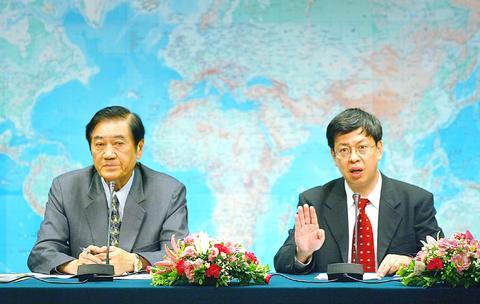Taiwan's strategy in seeking inclusion in the World Health Organ-ization as an observer has yet to be set in stone, but officials yesterday expressed optimism in light of the passage of a US Senate bill supporting Taiwan's bid.
"I am happy to be able to share good news with everyone -- the US Senate passed a bill in favor of Taiwan's bid for participation at the World Health Assembly [WHA]," Minister of Foreign Affairs Mark Chen (
The bill, which authorizes the Secretary of State to initiate a plan to endorse and obtain observer status for Taiwan at the upcoming annual WHA summit in Geneva, cleared the House of Representatives on April 21 and was passed by the Senate on May 6.

PHOTO: REUTERS
In light of the US support, Chen explained that officials were considering the possibility of asking diplomatic allies to call for a vote during the assembly's plenary session asking that Taiwan's bid be added to the World Health Assembly's agenda later this month.
In previous years, the General Committee has blocked placement of Taiwan's bid for observership on the World Health Assembly's agenda, preventing the application from reaching a vote.
Taiwan in 1997 asked diplomatic allies to call for a vote on adding Taiwan to the assembly's agenda. According to Chen, when the assembly voted on Taiwan's inclusion on the agenda, the vote had been 120 opposed, 19 in favor and 5 abstentions.
"We're still not 100 percent sure that we will ask our allies to call for a vote this year. We need to get a better grasp of the number of votes that will be in support of Taiwan before deciding," Chen said.
"Putting Taiwan's bid up for a vote by the Assembly will allow more nations to really consider the meaning behind Taiwan's participation," Department of Health Director General Chen Chien-jen (
In addition, Chen Chien-jen also announced yesterday that this year's WHO bid would focus on four primary points: Taiwan's right to health should not be subject to political interference, Taiwan's public health experience can benefit other nations, Taiwan is willing to contribute resources to global health and humanitarian needs, and Taiwan is willing to participate in all WHO health initiatives.
However, Mark Chen said that this year's bid was different from last year's, due to explicit support from the US.
"This year is unique, because US Assistant Secretary of State for East Asian and Pacific Affairs James Kelly said the US will support Taiwan's bid no matter the strategy implemented," Mark Chen said.
During testimony in a hearing on Taiwan, conducted by the House International Relations Committee, Kelly spoke in support of Taiwan's bid, saying that "Taiwan's problem obtaining observer status is certainly not due to a lack of US commitment."
Mark Chen also commented that Japan would take into consideration the US' lead in supporting Taiwan. Japan has already expressed that its support this year "will not be less than previous years."
If China decides to apply for Taiwan's participation as an associate member, this would be "politicizing" Taiwan's WHO bid, which is unacceptable, Mark Chen said.
Both Mark Chen and Chen Chien-jen yesterday warned that while the public should be hopeful, obtaining WHO observership this year would be a difficult task.

FALSE DOCUMENTS? Actor William Liao said he was ‘voluntarily cooperating’ with police after a suspect was accused of helping to produce false medical certificates Police yesterday questioned at least six entertainers amid allegations of evasion of compulsory military service, with Lee Chuan (李銓), a member of boy band Choc7 (超克7), and actor Daniel Chen (陳大天) among those summoned. The New Taipei City District Prosecutors’ Office in January launched an investigation into a group that was allegedly helping men dodge compulsory military service using falsified medical documents. Actor Darren Wang (王大陸) has been accused of being one of the group’s clients. As the investigation expanded, investigators at New Taipei City’s Yonghe Precinct said that other entertainers commissioned the group to obtain false documents. The main suspect, a man surnamed

DEMOGRAPHICS: Robotics is the most promising answer to looming labor woes, the long-term care system and national contingency response, an official said Taiwan is to launch a five-year plan to boost the robotics industry in a bid to address labor shortages stemming from a declining and aging population, the Executive Yuan said yesterday. The government approved the initiative, dubbed the Smart Robotics Industry Promotion Plan, via executive order, senior officials told a post-Cabinet meeting news conference in Taipei. Taiwan’s population decline would strain the economy and the nation’s ability to care for vulnerable and elderly people, said Peter Hong (洪樂文), who heads the National Science and Technology Council’s (NSTC) Department of Engineering and Technologies. Projections show that the proportion of Taiwanese 65 or older would

Democracies must remain united in the face of a shifting geopolitical landscape, former president Tsai Ing-wen (蔡英文) told the Copenhagen Democracy Summit on Tuesday, while emphasizing the importance of Taiwan’s security to the world. “Taiwan’s security is essential to regional stability and to defending democratic values amid mounting authoritarianism,” Tsai said at the annual forum in the Danish capital. Noting a “new geopolitical landscape” in which global trade and security face “uncertainty and unpredictability,” Tsai said that democracies must remain united and be more committed to building up resilience together in the face of challenges. Resilience “allows us to absorb shocks, adapt under

Taiwan Semiconductor Manufacturing Co (TSMC, 台積電) yesterday said it is building nine new advanced wafer manufacturing and packaging factories this year, accelerating its expansion amid strong demand for high-performance computing (HPC) and artificial intelligence (AI) applications. The chipmaker built on average five factories per year from 2021 to last year and three from 2017 to 2020, TSMC vice president of advanced technology and mask engineering T.S. Chang (張宗生) said at the company’s annual technology symposium in Hsinchu City. “We are quickening our pace even faster in 2025. We plan to build nine new factories, including eight wafer fabrication plants and one advanced